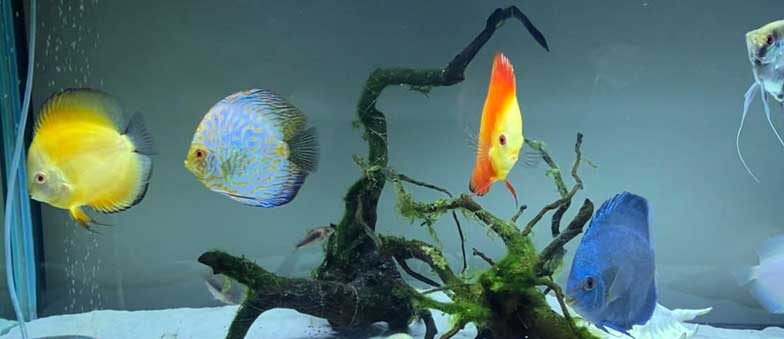
To keep your Discus fish healthy, you must first make sure that your Discus fish is well fed with appropriate Discus food, as well as ensuring that your Discus aquarium or tank is regularly clean and free from toxic substances that can harm discus.
Table of Contents
How To Keep Healthy Discus Fish?
here are 5 main factors to keeping healthy Discus, if you maintain them, you will never get any health issues with any of your Discus:
- Regular Tank Maintenance
- Discus Healthy Environments
- Stress-Free Discus
- Discus Proper Dietary
- Proper Procedure When Introducing New Fish To The Tank
[1] – Regular Tank Maintenance
For your Discus to be healthy, you need to perform regular tank or aquarium maintenance which include:
- Regular Water Changes
- Aquarium Tank Cleaning
- Aquarium Filter Cleaning
Regular Water Changes
Changing the water in the tank regularly is a must-do process to ensure that the environment does not become stressful for Discus, in other words, regular water changes are the most important action to take in order to keep a healthy Discus.
The point of making sure that the water in the tank is changed is to inhibit the buildup of waste from either the droppings of the fish or from the food they may not have eaten (in a case of overfeeding).
In a situation where you want to use tap water in your tank, you can treat the tap water with a water Conditioner before you pour the tap water into the aquarium; the water in the tank must not contain chlorine (use tap water that has been dechlorinated).
Despite the maintaining of proper water parameters (as you will see below in this article), there is one additional piece of information that should be maintained which is the consistency of using the same water source, even if it was tap water, as long as you are using the same water source every time this will ensure your fish to be healthily steady.
Aquarium Tank Cleaning
Discus aquarium cleaning should be carried out while changing the tank water every week, cleaning the tank should include:
- Sucking the waste from the substrates using the Python solution.
- Cleaning the aquarium glass wall from inside using a cleaning kit.
- Removing extra dead plants from the aquarium.
Keeping your tank clean also means that you have to clean out the little gravels in the tank because waste materials may have gotten attached to them; after cleaning the tank thoroughly. You can use a tank cleaner to clean out the gravel without having to disturb the fishes or stir up the dirt upon which the plants – for a planted tank – grow.
The walls of the tank, for instance, must be cleaned thoroughly from all algae; Discus fishes are a very tender kind of fish – this means that they are easily affected by diseases and poor tank conditions.
Also, if your Discus tank has live plants, eventually you will see dead pieces of the plants are floating on the water surface which could cause bacteria built-up, so they should be removed from the tank.
Aquarium Filter Cleaning
Furthermore, as regards how to keep healthy Discus, to ensure regular maintenance of your Discus tank means making sure that the filter in the tank is also clean. The proper filters to use in a Discus tank is an overhead filter or an external filter.
While cleaning out your Discus tank, ensure you clean out the filter as well as it is an important part of the general care for discus.
A healthy environment for discus is a tank that uses a Canister Filter filtration system. This device makes cleaning of the tank easy without having to startle discus, does not take up space in the tank, and has a large area of filtration such that there are little or no clogs in the filter.
For Canister type filter, they should be cleaned every 1 to 2 months depending on the size of your aquarium and how many fishes you have in the tank, in general, if you see that the ammonia is being raised in the tank, most probably this is an indication that your filter needs to be cleaned.
[2] – Discus Healthy Environments
To maintain healthy environments for your Discus fish, you have to maintain the following:
- Proper Discus Water Parameters
- Sustainable Proper Temperature
- Large Tank Size
- A Lot Of Oxygine
- Do Not Over Feed
Proper Discus Water Parameters
While regular water changes are the most important thing to do to keep a healthy Discus fish, maintaining proper water parameters is not less important than that, so it’s very important to monitor your water parameters hence the perfect water parameters for Discus fish as below:
- Acidity or Alkalinity (pH): 6.0 – 7.5
- Carbonate Hardness (KH): 5 – 10 dKH
- Nitrate (NO3): ~ 12 – 15 mg/I
- Nitrite (NO2): 0 mg/I
- General Hardness (GH): 6º d – 16º d
- CI2: 0 mg/I
- Ammonia: 0
Sustainable Proper Temperature
The water temperature is another thing to take cognizance of as regards Discus care. Discus prefers water that is warm, Discus tank water temperature should be kept between 82° and 86° F (28° – 34° C) all the time, if less or more than that Discus will be stressed and you might find it not eating well or hiding.
Large Tank Size
One tip that is important to take note of on how to keep Discus, is to use a large tank – Discus fishes prefer a tank that can carry a water capacity of 55 gallons or more.
Making use of a large tank or aquarium is another important tip that must be taken note of when you’re thinking about how to keep a healthy Discus.
A Lot Of Oxygine
Oxygen is very important in your tank especially for tropical fishes like Discus; you can use an air pump to ensure that there is regular pumping of oxygen into the tank or aquarium. Air stones are also recommended because the high temperature of the water can decrease the amount of oxygen in the tank.
Do Not Over Feed
Overfeeding your Discus will increase the possibility of food leftovers, this will lead eventually to an increase in the toxic ammonia in the water, which is a bad thing for your fish’s health.
[3] – Stress-Free Discus
One of the helpful tips on keeping Discus is to make sure that everything that will stress Discus in your tank is removed.
Some of which include; the low amount of dissolved oxygen in the water, high levels of ammonia and nitrates developed from waste or decomposed food, bullying (nipping) from other species of fish, bad water conditions, overcrowded tank, inconsistent lighting, injuries on the body of Discus that are not healing, noises or vibrations which startle the fishes, poor nutrition and diet, and diseases or infections.
Discus do well in a tank when there are other Discus fishes, on that note, your tank or aquarium must contain a minimum of six (6) discus fishes.
[4] – Proper Dietary
The proper kinds of food which serve as Discus food include pellets, fish flakes, and live or frozen foods.
Live foods are very essential in providing the necessary nutrients to ensure the growth of a healthy fish. If you want to feed pellets to your Discus, ensure that the pellets are soaked in water first before feeding them to the Discus for easy digestion. However, live foods that are best for discus include bloodworms, white and black worms, and brine shrimps. If you purchase these foods in a frozen state, make sure that you de-ice them first before feeding them to your Discus.
If you are keeping baby Discus fishes, feed them up to about 12 on a daily basis because baby Discus fishes can eat up to that many times a day; young Discus fishes feed up to 5 times on a daily basis, and adult Discus fishes feed 2 times daily. However, be careful to not overfeed your discus – feed discus with as much food as they can eat in an active manner for a period of 5 minutes.
For deeper details about Discus fish food, you may refer to my other article Discus food 101 guide for beginners.
[5] – Introducing New Fish To The Tank – Proper Procedure
Before you introduce a new fish into the tank, do the following:
[Step 1] – Speak to an expert
To verify if the new Discus fish you are adding is compatible with Discus and the size of the fish is appropriate for the tank and that at its adult stage it won’t be too large for the tank.
[Step 2] – Prepare a hospital tank (a separate tank)
Place the new Discus in a separate aquarium for a week to ensure there are no infections or diseases the new Discus has.
[Step 3] – Adding the New Fish To The Hospital Tank
Take the bag in which the new fish came and place it to float on the water in your tank for about 10 minutes. Then open the bag and pour 1 cup of your tank water inside it after which you seal the bag again and allow it to float for another 10 minutes.
Keep the lights off for a couple of hours after adding the fish to allow the fish to adjust to the new environment.
[Step 4] – In Your Main Discus Tank
Ensure that there are places and objects that can shelter the fish (where the fish can hide) such as plants and rocks.
[Step 5] – Feed your current Discus in your tank
Feed your current Discus in your tank before you introduce a new fish so as to reduce the incidence of aggression.
[Step 6] – Turn off the lights in the aquarium
Turn off the lights in the aquarium and dim the room lights; this ensures the environment is less stressful.
[Step 7] – Transfer The New Discus To The Main Aquarium
How Do I Know If My Discus Is Healthy?
One of the things that assure you that your Discus is healthy is its shape. Discus has a round shape, so if Discus looks more like a cone rather than around, that discus is not healthy.
The following are ways you can know that Discus is NOT healthy;
- The fins are clamped.
- The eyes are large and cloudy or dark.
- The Discus skin is dark.
- The stomach is either pinched or bloated.
Conclusion
To ensure that your Discus fish stays healthy, you need to ensure that your tank stays in a healthy condition with the required water conditions and filtration system. Make sure that stress elements within the tank are removed to allow discus to float comfortably in the tank; if you must add another species of fish to the tank, it should be one that is compatible with Discus.


I’m really want discus I have 6 aquarium now as I just set up a 55gal tank I also have a 150gal 85gal 40gal 20gal and 10gal quarantine tank all of my aquarium’s have been running from 2 to 5 years now but I am still a little bit worried about taking care of discus
You will not learn if you do not try.
good luck.